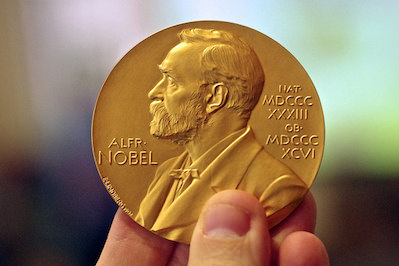The Nobel Prize in Economics Is a Force for Market Fundamentalism
The honor dignifies those who advocate surrendering the public’s power to ensure the common welfare and legitimizes the destruction such policies create, writes Avner Offer, economic historian at Oxford and co-author of a new book on the award.
The Nobel Prize in economics, being announced Monday, dignifies those who advocate ceding to private interests the public’s power to ensure the common welfare and legitimizes the destruction their policies create, writes Avner Offer, economics historian at Oxford and co-author of “The Nobel Factor: The Prize in Economics, Social Democracy and the Market Turn,” at The Guardian.
Like market liberalism, [orthodox] economics regards buying and selling in markets as the template for human relations and claims that market choices scale up to the social good. But the doctrines of economics are not well founded: premises are unrealistic, models inconsistent, predictions often wrong. The halo of the prize has lent credibility to policies that harm society, to inequality and financial disorder.
Economics does not have the field of policy entirely to itself. A different view of the world – social democracy – is used by governments to allocate about 30% of GDP in most developed countries for employment, healthcare, education, and pensions. Social democracy is not only a political orientation but also a bipartisan method of government. Like economics, it accepts the primacy of markets in production and consumption. Markets reward wealth and success. In social democracy, entitlement is equal, and arises from citizenship, though one-size-fits-all sometimes creates its own problems.
The Nobel prize came out of a longstanding social conflict. On one side, central banks and the better-off striving to keep property intact and prices stable; on the other, everyone else’s quest for economic security. The Swedish social democratic government clipped the wings of the central bank – Sveriges Riksbank – in pursuit of more housing and jobs. In compensation, the government allowed the central bank to keep some funds, which the bank used in 1968 to endow the Nobel prize in economics as a vanity project to mark its tercentenary.
The prize is controlled by a committee of Swedish academics. It was long held captive by centre-right economists. Assar Lindbeck was chairman between 1980 and 1994, and intervened stridently in politics. Competent economists agreed, he said, that high taxes and full employment would lead to disaster. Like British and American economists later, he missed the danger of loose credit, which caused a severe crisis in Sweden in the 1990s.
The prize achieved credibility by means of a rigid balance between pairs of opposites, the right and left, theoreticians and empiricists, Chicago economists and followers of Keynes. Surveys show that economists are to the left of the committee in their sympathies (if not their doctrines). Prize winners are mostly the best economists and provide a good sense of what the discipline is about. But only one of them (Gunnar Myrdal) expounded social democracy. Left-leaning Nobel economists still favour market solutions.
This is costly. Social democracy is not as deeply theorised as economics, but has been enormously successful in providing social and public goods. It has kept economic insecurity at bay. Its method of mutual support is more efficient and equitable than private healthcare, education, and pensions. Social-democratic politicians do not always understand this. If economics is compelling, social democracy is indispensable. The two doctrines have adapted to each other but their marriage is not happy.
.
—Posted by Alexander Reed Kelly
Independent journalism is under threat and overshadowed by heavily funded mainstream media.
You can help level the playing field. Become a member.
Your tax-deductible contribution keeps us digging beneath the headlines to give you thought-provoking, investigative reporting and analysis that unearths what's really happening- without compromise.
Give today to support our courageous, independent journalists.






You need to be a supporter to comment.
There are currently no responses to this article.
Be the first to respond.